Crime fiction books grab readers and refuse to let go. That itch to flip pages faster, that urge to solve the puzzle before the detective, it doesn’t happen by accident. These stories hook us because crime fiction authors build intricate traps for our curiosity.
They plant questions in every chapter, dangling answers just out of reach. You think you’ve cracked it, then the story swerves hard. This isn’t luck. It’s cold, calculated writing that turns casual readers into obsessed sleuths.
Why Crime Fiction Books Hook Our Brains
Our minds crave puzzles, and nothing can feed that hunger perfectly than crime fiction books. You aren’t just watching a detective connect dots; you’re racing them to the finish line. Great crime fiction authors max out on this by playing fair while misleading brilliantly.
They scatter real clues beside red herrings, making you second-guess every hunch. It’s a mental tug-of-war where the rope keeps slipping from your hands. The magic lies in balance: give too little, readers feel cheated; reveal too much, tension dies. The best crime fiction books walk that tightrope chapter after chapter.
Crime Fiction Authors Control the Clock
Timing is everything in suspense, and crime fiction authors are master clockmakers. They know exactly when to introduce a game-changing witness. They understand the perfect moment to drop a bloody glove at the crime scene. They feel when to make an alibi crumble mid-interrogation.
Also, pacing separates forgettable stories from unforgettable ones. Rushed reveals feel cheap. Dragged-out ones bore. But when crime fiction authors stretch tension like a rubber band, snapping it at the perfect moment, readers can’t look away. Every sentence becomes a countdown timer ticking in your head.
Characters Make Crime Fiction Books Breathe
Compelling crime fiction books live through messy, flawed humans… the recovering addict detective… the sweet neighbour hiding an illegal chemical stash… the widow who knows more than she admits. Crime fiction authors pour life into these people because they know you won’t care who stole the diamonds unless you care about who gets hurt.
These characters become your partners in sleuthing. You celebrate their breakthroughs and get frustrated at their mistakes. When they’re in danger, your pulse spikes because they feel real. That connection turns plot points into personal missions that keep you reading past midnight.
Settings Whisper Secrets in Crime Fiction Books
Location isn’t just a backdrop in top crime fiction books; it’s a silent accomplice—rain-slicked alleys where footsteps vanish, dusty libraries hiding coded journals, suburban kitchens with knives missing from the block.
Crime fiction authors capitalize on environments to amplify dread. A creaking floorboard isn’t noise then; it’s a warning. That foggy pier isn’t weather; it’s a curtain hiding evidence. These spaces become psychological minefields where every detail might matter. Readers scan descriptions like crime scenes, hunting for what doesn’t belong, pulled deeper by these immersive worlds.
The Twist Machinery Only Crime Fiction Authors Master
The jaw-dropping twist isn’t a trick. It’s architecture. Clever crime fiction authors build revelations backward. First, they decide the shocking truth early. Then they work in reverse to plant subtle hints. Finally, they let readers overlook those hints amid distractions.
This is why rereading great crime fiction books feels like entering a new story. Those “aha” moments were there all along, camouflaged in plain sight. The genius lies not in surprise, but in inevitability. When the truth clicks, readers kick themselves for missing what now seems obvious, a testament to the author’s skill.
Works like Gaston Frigault’s Plausible Deniability and My Enemy’s Enemy epitomize this art, embedding clues in plain sight while orchestrating grand reveals.
Endings That Earn the Wait in Crime Fiction Books
Weak mysteries fizzle. Legendary crime fiction books detonate. The final pages must deliver on every promise: solving the puzzle, justifying the chase, and landing emotional punches.
Crime fiction authors sweat these endings because they know readers invest hours getting here. Satisfaction comes from answers that feel both surprising and inevitable. Loose threads tie up cleanly. Motives make haunting sense. And that last line should echo in your mind for days, closing the case while leaving room for wonder. That’s how the masters make you crave their next book immediately.
Why We Keep Coming Back to Crime Fiction Books
Crime fiction books dominate shelves because they offer the ultimate brain game. They let us experience danger without risk, and solve evil without facing it. Each book is a safe house where we exercise our curiosity and intuition.
And as long as crime fiction authors like Gaston Frigault keep churning out these addictive puzzles, readers will keep turning pages, chasing that glorious moment when the final piece clicks into place. It’s a dance between writer and reader where the best moves leave us breathless for an encore.






